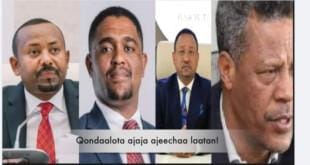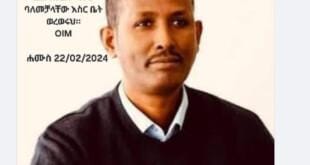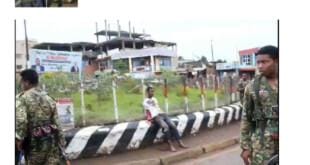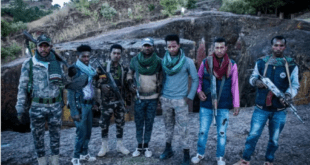
We all have followed the once sad news of the Oromo in particular, and all Ethiopians in general, suffering in Saudi Arabia (in 2013). Jawar Mohammed reacted to these assaults on the immigrants in the Gulf states: “we must take back our homeland to end the Oromo national homelessness.” The conservative Habeshanized forces, on the other hand, tried to capitalize on this situation, as usual, and started their pro-Habeshanism/pro-unity by force propaganda – of course, again, attacking Oromo nationalists, including Jawar himself. This event persuaded us to shortly formulate Oromo people’s goal and look, especially, if it contradicts with genuine unity of nations and peoples in the country – Ethiopia (Great Oromia). Oromo people’s political objective, regarding the type of Oromia’s sovereignty we want to have after achieving national freedom from any sort of alien rule, can be summarized in short as ‘self-rule of Oromia and/or shared-rule of Ethiopia.’
This summarized objective is goal of the people in general, but Oromo individuals and organizations can specify their aim by taking one of the three post-freedom sovereignty of Oromia and/or Ethiopia. For instance, Oromo Democratic Front (ODF) wants to realize ‘self-rule of Oromia and shared-rule of Ethiopia’ (multi-national federation); Oromo Liberation Front (OLF) wants to achieve ‘self-rule of Oromia’ (independent republic of Oromia); whereas Oromo nationals in multinational organizations like Arbegnoch Ginbot 7 (AG7) strive to foster ‘shared-rule of Ethiopia’ by making sure a transformation of the hitherto Abyssinian dominated Ethiopia to the henceforth Oromian-led Ethiopia (multi-regional federation). The three objectives are not as such disadvantageous for the Oromo, as long as the future rule of political game will be freedom and democracy. That is why Oromo organizations can confidently forge any sort of alliance against the tormenting TPLF Ethiopian regime. The whole move of Oromo organizations should be with a purpose to corner the fascist and racist regime in Finfinne palace, so that it will never have a peaceful life. Regarding the post-freedom sovereignty, we can look at six theoretical types of sovereignty. In political spectrum of the Oromo liberation struggle, there are the following theoretical post-freedom types of Oromia’s sovereignty:
3) Multinational federation of Ethiopia (transformation of the present fake killil-federation to genuine federation)
4) Multi-regional federation of Ethiopia (formation of regional states based on many criteria, not only on languge)
5) Dis-federation of Ethiopia (Kenya’s model, in which districts, not regions, will have self-administration)
6) An integrated Ethiopia (a unitary state without self-rule of states or districts)
Given the public will or popular sovereignty is the highest value, Oromo nation can have full right to choose one of the alternatives in the spectrum during a process of excercising our self-determination. But, from these theoretical possibilities, only three positions are entertained practically: the 1st, 3rd and 4th. Regarding the practical positions, there are organizations struggling in the name of Oromo – that are pursuing only the 1st and 3rd possibilities. The 4th position is entertained by certain Oromo individuals, who are organized under the name of Ethiopia within the so-called multinational (hibre-biher) parties. The classical examples are: for the 1st model, OLF; for the 3rd position, ODF; and for the 4th style, Oromo nationalists in AG7. Common denominator for all the three positions is a struggle for freedom from Abyssinian system of domination. Their political difference on the type of post-freedom sovereignty can be solved per public verdict in a possible future referendum after liberation. That is why the pro-independence OLF, the pro-federation ODF and the pro-unity AG7 can now work together against TPLF’s system of domination and struggle for freedom in unison.
But, in short, we can actually put all the later 5 positions, from 2–6, as a goal for ‘an integrated Ethiopia.’ That means, in short, there are only two main types of post-freedom sovereignty: an independent Oromia chosen by the OLF and an integrated Ethiopia opted by AG7; the third possibility being the combination of the two – i.e. self-rule of Oromia and shared-rule of Ethiopia planned by ODF. Anyways, the question yet to be answered is: how can we achieve either of these types of sovereignty? By mere means of being part of the ritual – “elections”? On the process of preparation to chart the way to freedom, we did observe that Ethiopia’s repeated fraudulent “elections” did confirm the necessity of decolonization before democratization – the goal which we can never achieve per ballot under rule of the present fascist and racist regime. Few years ago, there was a discussion going on regarding Ethiopian democratization (struggle for democracy) vs. Oromian decolonization (national freedom of the Oromo from any system of domination), which was firstly initiated by Addis Neger Online. The author of the article demanded that a certain Oromo Obama or Oromo Mandela take responsibility to democratize Ethiopia and give a lasting solution to problems of that region. What a nice wish and good demand! But is this a main objective of the Oromo? The author wrote his piece few days before the “election” 2010. He seemed to be optimistic about the possible “democratization and election in the country.”
Can such game of “election” lead us to ‘self-rule of Oromia and/or shared-rule of Ethiopia?’ To answer such questions, let me leave the oppression history in the country for historians and talk about the present situation under TPLF’s rule. No question that the ruling TPLF, the hegemonist caricature of the original TPLF, is dominating all nations in the country with iron fist since 1991. What a pity for Tigreans who died for the cause of freedom and democracy during their rebellion and struggled against the fascist Derg! Which of them thought that their organization, the TPLF, would transform into such a worse fascist and racist organization than the regime they had fought against? Unfortunately, not only did TPLF transform from a liberation front into such a fascist hegemonist force, but it also used to be an instrument for the only one dictatorial psychopath till the day of his death. Now, there is no more TPLF or any organization from Tigrai ruling the country, but there was only one psychopath as brutal as Hitler and Stalin, who ruled citizens and nations in the country with brute force and malicious manipulation. He gathered very submissive individuals with slave mentality from each nation in the country to use them as “representatives” of their respective nations. So, he got servants from Amhara, Oromo, Tegaru, Afar, Somali, Benishangul-Gumuz, Gamballa, Harari and all Southern nations. Now, the current puppet PM is doing the bidding, while junior TPLF leaders are manipulating him behind the screen. Is this a better condition for the Oromo to achieve our above mentioned objective – ‘self-rule of Oromia and/or shared-rule of Ethiopia’? Is taking part in the coming “election” the way to accomplish this objective?
The election in May 2010 was one of the situations where TPLF could show the two bad methods (force and manipulation) for the sake of perpetuating its rule further. Individual citizens and national groups in the country have been intimidated by force, and manipulated by fraud in order to make the dictator and his followers “win” the election. It could “win almost 100%” of federal and regional parliamentary seats. This election was similar to those which took place under dictators like Stalin, Sadam Hussen, Mengistu Haile-Mariam and so on. So, there was no surprise about the result. Why was the result also in 2015 like this? Why could not the country experience till now any sort of genuine democratic election? The answer may be as described below, in the following examples. Specially, elections in multinational countries like Ethiopia are competitions not only among political parties, but also among nations in the country for power and domination. In Ethiopia, the contest for power takes place particularly between the two Habeshanized nations (Amhara, Tegaru) and other oppressed nations, specifically the Oromo. The relationship between the Habeshanized ruling class and the Oromo nation is a relationship between colonizers and the colonized, whereas the relationship between the two Habeshanized nations is a competition between two colonizers, which is similar to the fight between England and France over Africa during their Scramble for Africa.
The present situation or the status quo in Ethiopia is comparable, for instance, with a scenario that: a smaller nation Denmark would occupy Germany, France and other nations in West Europe, make Paris its capital city, choose German language as a working language of the “federation” it formed, call its whole empire as Federal Democratic Republic of Europe and foster a government, where only individuals from Denmark take key positions in government, military, civil service and security. Is this not absurd? Unfortunately, this is what Tigreans (our Danish) are doing today in Ethiopia (our Europe). They came to Oromia (our France); made their capital city Finfinne (our Paris); chose as their working language Amharinya (our German language) and tell us that the country they do now rule dictatorially is called Ethiopia. Then, let’s imagine Danish people, Germans, the French and all other nations in such “European empire” are going to election under government of the fascist dictator from Denmark. Can any one imagine that Germans, French citizens and other nations of Western Europe, under such a dictator, vote for the fascist regime dominated by oligarchs from Denmark? Can anyone think that such a fascist dictator from Denmark can allow the election to be fair and free? Can we really believe that democratization of such “European empire” dominated and ruled by minority group from Denmark be possible?
Ethiopia now is such a conglomerate of different neighboring nations, which actually deserve their independence, and it is only after such freedom of nations from alien rulers that democratization of nation-states can be easier and possible as already practically seen in Europe. The question we need to answer is why do European regimes want us to do, what they actually don’t do for themselves and their nations? How can they repeatedly come to observe such almost an impossible election in Ethiopia or the futile attempt of democratization in the colonized (occupied, subjugated and oppressed) nations? To use another example to describe this country with a system of domination, it is almost similar to Apartheid of the former South Africa. Was it expected that South Africa be democratic before dismantling the system? Why then is Oromo nation, in particular, and other oppressed nations, in general, suffering under the looting, subjugation and lording of Tigrean oligarchs be expected to get our right per sham election orchestrated under the internal colonizers (TPLF’s regime of Meqele)? The only difference between South Africa and current Ethiopia is that, nations in South Africa were not colonized (dominated) by another nation from same region, but by white minority from Europe. That is why the answer to Apartheid was not necessarily decolonization in a form of autonomy for each nation. Being free from the system of Apartheid used by white minority regime was the sort of decolonization all nations together wanted to achieve. Can Oromo’s objective be the same to that of South Africans, which is devoid of national self-rule? Does opting for only shared-rule of Ethiopia be the same to South African model?
We can see that the first example of “European empire” is more appropriate to describe the situation in Ethiopia. If “Europe under Denmark oligarchs” needs to be democratized, no question that the subjugated nations like Germany and France should be liberated first. Then after, the liberated nation-states can have their fair and free democratic election. Of course, after that, the free and democratic nation-states can build union of free nations as they did in the form of the European Union (EU). I think this is a reason for the fact that they supported “disintegration” of Yugoslavia into free nation states, including the very small nations like Kosovo. These independent and democratic nation-states, with their own self-rule, are today part and parcel of European Union. If this method of achieving national freedom and multinational democracy is right for Europe, why do European regimes want us Africans move another way which didn’t work for them? The legacy of colonialism in the Horn of Africa, in particular, and Africa, in general, is artificial division of nations (ethnies), which they like to call “African tribes” per colonial borders. The colonialists either divided one nation to be included into more than two countries or clamped many nations together into one state (country). For instance, the only one nation (Somalia) was divided to be included into five countries (Djibouti, Ethiopia, Kenya, British Somaliland and Italian Somalia) as well as many nations in the Horn like Agaw, Oromo, Afar, Sidama, etc. are put together in only one Ethiopia ruled by Habeshanized elites under protection of the Western regimes.
Almost all African countries are suffering under the consequences of such arrangement, and yet Africans are accused and blamed by these same self-righteous Western regimes for the lack of democracy. For African nations to be really democratic, they should first get rid of these artificial colonial borders; nation-states based on free will must be established. Only such relatively monolithic nation-states can vote freely during elections in a possible multiparty democracy of respective nations free from unhealthy competitions among different nations for domination. Otherwise, in multinational countries, where nations are put together by force like in Ethiopia, there will always be a competition of nations for dominance, not the necessary competition of political parties for power. There can be certain arguments against such suggestion to have nation-states as a prerequisite for genuine democratization, because of the presence of many small nationalities in Africa, which may not be in a position to foster a viable independent state. For such smaller nations, a federal arrangement like that of a genuine Killil-federation (ethnic federalism), which is formally tried in the present Ethiopia, is a good arrangement. It needs only to be genuine, not so fake as it is now. Each nationality can have its own autonomous province (state), zone, district or county within a voluntarily formed multination-country, based on its size.
Coming back to the circumstances in Ethiopia, it is just a pipe dream to expect democratization of the empire as long as colonial system of domination is intact. This system of domination is now under absolute control of Tigrean elites from minority nation. Genuine and free democratization means loss of power for them, which further means lose of economical advantage they individually, as group of oligarchs and as minority nation do enjoy now. It is simply a naivety to expect these individuals and the group allow genuine democratization, while they do know what the consequence of losing this power is for them. Taking part in elections under such regime is good only for using the process as one means of struggle against tyranny. The participation of Medrek and others in the past “elections” has got only this purpose. If there was anyone who expected the TPLF to give up power per ballot, that was unrealistic. I personally have expected that a sort of peaceful public uprising had to follow the already programmed vote rigging. Unfortunately, neither Medrek nor any other political organization, be it “legal” or “illegal” was ready to call for such an uprising. This made me to ask, what is then the purpose of taking part in “elections”? Was boycotting not better? Some would say, “it was better to expose the undemocratic nature of TPLF.” Didn’t we do this during the elections in 1992 and 2005? Is this anti-democratic nature of the TPLF not known? Can it be different in any “election” in that country? If not different, then how can the Oromo materialize our objective – ‘self-rule of Oromia and/or shared-rule of Ethiopia’?
Actually, the best approach against such fascist dictators is only to fight them without any compromise. Beside the “legal parties,” which are accompanying the regime in sham elections, there should be underground organizations and armed forces, which are ready to force such a regime to give up grip of power it has in Finfinne palace. I had an expectation that the underground movement of AG7 and the likes in addition to the rebel forces like the OLF and the ONLF could make the public uprising possible following the already known vote rigging. Now it seems, this was just a wishful thinking of the few, including me. Where we know that TPLF oligarchs never allow democratization and even the reactionary unitarists are not ready to see the domination system destroyed, what should be the future approach? The few Habesha democrats, like those in AG7 and ESP (Ethiopian Semayawi Party), should be determined to make an alliance covertly or overtly with liberation forces like the OLF and ONLF in order to dismantle the domination system (i.e. decolonization of all suffering nations, including the Amhara and Tegaru oppressed mass). Let me hope that very few from the conservative parties like AEUP and EPRP also follow the same procedure. Now, it is not a right time for opposition forces to talk about democratization, but for all to struggle for decolonization of oppressed nations together. Interestingly, Amhara nationals are starting to sense what it means to live under national oppression. Most Tegaru elites actually know it very well, that is why they fought against it until their struggle has been hijacked by the TPLF junta. Now, it is the time for such forces of decolonization from all nations to come together and figtht for freedom in unison.
What can be common ground for the decolonization forces from these different nations to forge a sort of alliance against TPLF oligarchs? The common ground can not be either “unconditional independence without union,” which is propagated by certain liberation fronts or “unconditional unitary state without national independence,” the mantra which is always prayed by some patriotic forces. The way forward as common purpose can be a sort of consensus on the necessary union of free nations in Ethiopia, which is the goal of some democratic forces like ODF and Medrek. Hopefully, many of those from liberation fronts and patriotic fronts will give up their ultra-left and ultra-right positions, respectively, and come together in this middle position of democratic federalists. Unfortunately, TPLF is still instrumentalizing both the left and right poles to make them fight each other and neutralize each other. This makes them not to be a challenge for TPLF, so that it could balance the two poles for its own benefit. That is why we do hear, see and read TPLF cadres being camouflaged as either of the two ultra forces to attack the other side so that it could seem as if the main struggle is between these two, instead of the fighting of all against the evil TPLF. I hope, at the end of the day, when these three freedom forces (pro-independence, pro-federation and pro-unity) agree on the above mentioned middle position, it will be very easy for such an alliance of all oppositions to engage TPLF with appropriate methods to compel it to give up power, without unrealistically expecting that it will do this per ballot box. In case such consensus on the middle ground is impossible, then to pursue one’s program and leave final decision for the public verdict is an alternative, so that one of the three alternative goals in Oromo’s summary objective – ‘self-rule of Oromia and/or shared-rule of Ethiopia’ – can be realized. For the Oromo, even democratization of Ethiopia without an independence of Oromia per se, but with self-rule of the six traditional regions (Boorana, Baarentu, Arsi, Macca, Tullama and Wallo) is not a loss, as long as it will be decided based on the principle of respecting popular sovereignty of Oromo nation.
Such allied and united opposition can easily start a coordinated struggle using three best methods against the fascists: civil disobedience, armed struggle and public uprising. Taking part in elections should only be for the sake of facilitating these methods, not for the sake of taking power per ballot box as if elections are going on in a democratic nation-states. It can not be otherwise in the future “elections.” Democratization of an empire with colonized nations is practically impossible. Let’s first decolonize such nations, which are still suffering under the system of domination and, then we can talk about democratization of each nation in a possible union of free peoples. Trying to persuade us now to talk again about democratization process is simply one of the ways used by TPLF oligarchs just in their attempt to fool us. So, we had enough election processes to expose TPLF in front of the “gullible” international community, which has either naively or deliberately accepted the TPLF-led country as one of “African nations, which is on the noble road of democratization.” The OLF already exposed the undemocratic nature of TPLF in 1992, just a year after its takeover of power in Finfinne palace. CUD and UEDF did the same job of exposing TPLF in 2005; Medrek and AEUP repeated it in 2010; OFC did the same during 2015 “election”. From now on, we do not need this job of exposing TPLF any more. This can not be the purpose of taking part in any “election”. What we need is to come together, forge a necessary alliance based on the above mentioned common ground and then fight against the fascists, specially by using the above mentioned effective three methods (civil disobedience, armed struggle and public uprising).
Let’s first decolonize oppressed nations, i.e. get our freedom from TPLF, and then democratize all national areas of Ethiopia in the form of multiparty competition. Yes, democratization of the empire is impossible, decolonization should precede democratization, i.e. citizens’ and nations’ freedom should be achieved in order to exercise democracy. After decolonization (after achieving freedom from the system of domination), we can democratize all the decolonized nations, which can have a possibility to foster union of free peoples in Ethiopia on grave of the already existing Tigrean empire, based on the genuine free will of all concerned nations. Even if it is necessary, trying to democratize an empire is only a means to disintegrate its system, but not the end by itself. As a summary, in this struggle for freedom and democracy, the fact on the ground shows us that there are two lines of opposition movement against the fascist and racist regime in the empire: the line of multinational federation as a prelude to an independent Oromia (the ODF-OLF line) and the line of multi-regional federation as a prelude to an integrated Ethiopia (the AG7-ESP line). If the two lines fail to foster a consensus in order to pursue one common line, they can agree on a struggle for freedom from TPLF and for democracy (including referendum on the two lines) after the demise of TPLF. Both routes and their results are not as such disadvantageous for the Oromo people. Can the two camps agree on these common factors (freedom and democracy) and cooperate to remove the worst evil we have ever faced in Ethiopia? Time will show us, but the Oromo polity must do every thing under the sun to coordinate the necessary cooperation of the two lines for there is nothing the Oromo people will lose if we follow both lines of freedom movements. At the end of the day, one of the components of Oromo’s summarized objective – ‘self-rule of Oromia and/or shared-rule of Ethiopia’ – can be fulfilled. May Waaqa help us see these three alternative possibilities (an independent Oromia of the OLF, Oromia in Ethiopia of the ODF & an integrated Ethiopia of the AG7)!
Galatooma!




